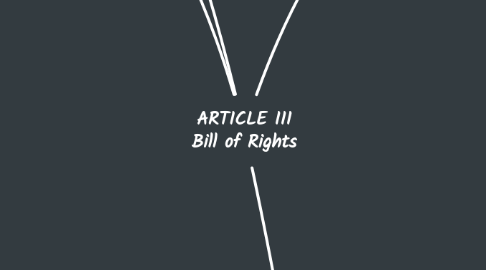
1. Background
1.1. 17th-18th Century - period of Enlightenment or "Age of Reason" brought about a shift of power from the crown to the individual. From Individualism, Liberalism formed, advocating egalitarian principles where: men, regardless of status or standing, are regarded as equals in terms of rights before the law.
2. Concept
2.1. also known as the "Charter of Liberty" - a charter of liberties for the individual & a limitation upon the power of the State.
3. Classes of rights:
3.1. Natural Rights
3.2. Constitutional Rights
3.2.1. Political Rights
3.2.2. Civil Rights
3.2.3. Social & Economic Rights
3.2.4. Rights of the accused
3.3. Statutory Rights
4. Rights of the accused *an implication of historical array during Martial Law. *
4.1. **Section 12** (1) Any person under investigation shall have the right to be informed of the *Miranda rights. * (2) No torture, force, violence, threat, intimidation, or any other means which vitiate the free will shall be used against him. Secret detention places, solitary, incommunicado, or other similar forms of detention are prohibited. (3) Non-acceptance of any confession or admission obtained in violation of this. (4) Sanctions for violations, and compensation to the rehabilitation of victims and their families.
4.2. **Section 13** The right to bail & against excessive bail.
4.3. **Section 14** (1) No person shall be held to answer for a criminal offense without due process of law. (2) Rights of the accused: - be presumed innocent until the contrary is proved - enjoy the right to be heard by himself and counsel - be informed of the nature and cause of the accusation against him - have a speedy, impartial, and public trial - meet the witnesses face to face - have compulsory process to secure the attendance of witnesses and the production of evidence in his behalf.
4.4. **Section 15** The writ of habeas corpus.
4.5. **Section 16** The right to a speedy disposition of cases.
4.6. **Section 17** Right against self-incrimination.
4.7. **Section 19** - Excessive fines shall not be imposed. - Prohibition against cruel, degrading, or inhuman punishment. - Death penalties reduced to reclusion perpetua.
4.8. **Section 20** No person shall be imprisoned for debt or non-payment of a poll tax.
4.9. **Section 21** Right against double jeopardy.
4.10. **Section 22** "No *ex post facto* law or bill of attainder shall be enacted."
5. Rights of the People
5.1. Life/Security/Privacy
5.1.1. **Section 1** Right to life, liberty, and property; and equal protection of the laws.
5.1.2. **Section 2** Right of the people against unreasonable searches and seizures. Security of no issuance of search warrant or warrant of arrest *except upon probable cause to be determined personally by the judge. *
5.1.3. **Section 3** Right to the privacy of communication and correspondence.
5.1.4. **Section 10** "No law impairing the obligation of contracts shall be passed."
5.1.5. **Section 11** Free access to the courts and quasi-judicial bodies and adequate legal assistance.
5.1.6. **Section 18** (1) Right to non-condemnation for political beliefs & aspirations. (2) No involuntary servitude in any form *except as punishment for crime *
5.2. Press, Speech/Expression, Information, & Assembly/Association
5.2.1. **Section 4** Freedom of speech; Right to press freedom; Freedom of assembly; Right to petition.
5.2.2. **Section 5** Free exercise, enjoyment, and expression of religious profession and/or worship, without discrimination or preference.
5.2.3. **Section 7** The right of the people to information on matters of public concern shall be recognized.
5.2.4. **Section 8** The right to form unions, associations, or societies.
5.3. Property/Movement
5.3.1. **Section 6** Liberty of abode, and the right to travel.
5.3.2. **Section 9** Private property shall not be taken for public use without just compensation.
